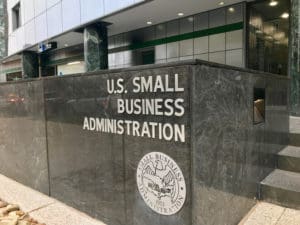 Starting today, April 3, 2020, small businesses can begin making application for a forgivable loan under the Payroll Protection Program (PPP) offered through the recently enacted Coronavirus Aid, Relief and Economic Security (CARES) Act. The Act makes available $349 billion to small businesses primarily to keep employees on the payroll and cover other critical expenses. Most importantly, these loans will be forgiven in their entirety if all employees are kept on the payroll for eight weeks and the money is used for payroll, rent, mortgage interest or utilities.
Starting today, April 3, 2020, small businesses can begin making application for a forgivable loan under the Payroll Protection Program (PPP) offered through the recently enacted Coronavirus Aid, Relief and Economic Security (CARES) Act. The Act makes available $349 billion to small businesses primarily to keep employees on the payroll and cover other critical expenses. Most importantly, these loans will be forgiven in their entirety if all employees are kept on the payroll for eight weeks and the money is used for payroll, rent, mortgage interest or utilities.
Eligible business include small businesses, sole-proprietors, independent contractors, self-employed individuals, non-profits, and veterans’ groups with less than 500 employees. Certain accommodation, lodging, and food service businesses with no more than 500 employees per physical location are also eligible. Businesses must have been in operation by February 15, 2020.
Application can be made through any federally insured bank or credit union or Farm Credit System institution. No collateral or personal guarantees are required, and according to the SBA, neither the government nor lenders will charge small businesses any fees.
Eligible businesses can receive loans up to 2.5 times their average monthly payroll, not to exceed $10 million. Average monthly payroll includes:
- Compensation (salary, wages, commission, or similar compensation, cash tips, etc.);
- Guaranteed payments to owners (draw);
- Payment for vacation, family, medical, and sick leave;
- Allowance for employee dismissal or separation;
- Payment for group health-care benefits, including insurance premiums;
- Payment of employee retirement benefits; and
- Payment of state and local taxes imposed on the compensation of employees.
PPP does not, however, count the following expenses when calculating the total PPP reimbursement amount:
- Any compensation over $100,000 per employee;
- Taxes imposed under chapters 21 (payroll taxes), 22 (railroad taxes and retirement benefits), and 24 (income taxes withheld on wages) of the Internal Revenue Code (IRC);
- Compensation of employees whose principal place of residence is outside the United States;
- Qualified sick and family leave for which a credit is already allowed under other sections (i.e., 7001 and 7003) of the Family First Coronavirus Response Act; and
- Loans used for duplicate purposes of another SBA loan program already claimed by the applicant.
Loan proceeds can be used to pay:
- Employees’ salaries, commissions, or similar compensation;
- Guaranteed payments to owners;
- Costs related to the continuation of group health-care benefits during periods of paid sick, medical, or family leave and insurance premiums;
- Payments of interest on any mortgage obligations (not including prepayment fees or payment of principal on the mortgage itself);
- Rent (including rents under a lease agreement);
- Utilities; and
- Interest on any other debt obligations that were incurred before the relevant covered period.
Notably, the SBA will fully forgive all loans under the PPP provided three requirements are met:
- Loans are used exclusively for their intended purposes (see bullet points directly above);
- Loans are used to offset no more than eight weeks (the maximum amount of time payroll expenses would be fully offset) of eligible payroll expenses; and
- Businesses retain employees at salary levels comparable to before the crisis.
In short, forgiveness will be reduced if full-time headcount declines, or if salaries and wages decrease. If proceeds are not used as prescribed, loan payments are still deferred for six months with a maturity of 2 years at 0.5% interest.
Finally, keep in mind forgiven loans qualify as income subject to income tax, but that seems a small price to pay for what is otherwise free money to keep your business running and your employees employed. If you have any questions, please feel free to call us.

Recent Comments